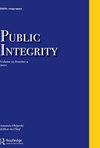U.S. Bail, Pretrial Justice, and Charitable Bail Organizations: Strengthening Social Equity and Advancing Politics and Public Ethics of Care
IF 1.3
Q3 PUBLIC ADMINISTRATION
引用次数: 0
Abstract
Abstract The U.S. criminal legal system contributes to the oppression and harm of marginalized groups, calling into question ethical governance. The front end of this system, specifically bail and pretrial justice, exploits opportunities for resource generation and social control as a major driver of incarceration, yet receives limited attention in public administration or ethics. Disproportionate punishment and collateral penalties associated with bail and pretrial justice are causes and consequences of structural racism and administrative dysfunction. Excessive bail as a poverty penalty incurs risks to health, safety, financial security, and constitutional presumptions and protections. In light of civil and constitutional rights concerns, bail and pretrial-associated philanthropic solutions have proliferated. This article provides background on bail and pretrial justice policies and politics; outlines evidence of related consequences; describes select reform efforts and philanthropic tools, including the charitable bail organization The Bail Project; and contextualizes bail and pretrial justice within a public values framework, which centers social equity and incorporates critical race theory alongside politics and public ethics of care. Upholding the Constitution and the law, strengthening social equity, and ensuring procedural due process are core tenets of good governance, yet anathema to the current bail and pretrial justice system, which is a critical public ethics concern.美国保释、审前司法和慈善保释组织:加强社会公平,推进政治和公共关怀伦理
本文章由计算机程序翻译,如有差异,请以英文原文为准。
求助全文
约1分钟内获得全文
求助全文

 求助内容:
求助内容: 应助结果提醒方式:
应助结果提醒方式:


